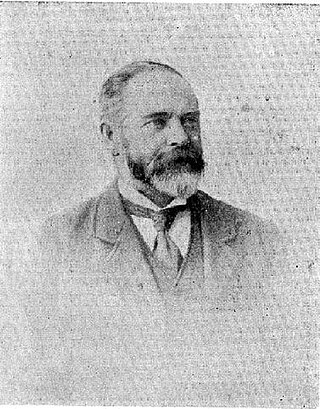Related Research Articles
The 2nd New Zealand Parliament was a term of the Parliament of New Zealand. It opened on 15 April 1856, following New Zealand's 1855 election. It was dissolved on 5 November 1860 in preparation for 1860–61 election. The 2nd Parliament was the first under which New Zealand had responsible government, meaning that unlike previously, the Cabinet was chosen by Parliament rather than by the Governor-General of New Zealand.

The 1881 New Zealand general election was held on 8 and 9 December in the Māori and European electorates, respectively, to elect 95 MPs to the 8th session of the New Zealand Parliament.

The 1893 New Zealand general election was held on 28 November and 20 December in the European and Māori electorates, respectively, to elect 74 MPs to the 12th session of the New Zealand Parliament. The election was won by the Liberal Party, and Richard Seddon became Prime Minister.

Wairarapa is a New Zealand parliamentary electorate. It was first created in 1858 and existed until 1881. It was recreated in 1887 and has since existed continuously. The current Wairarapa electorate MP is Mike Butterick.

George Allen was Mayor of Wellington, New Zealand, for three weeks in 1879.

Alfred Kingcome Newman was the mayor of Wellington, New Zealand, in 1909–1910, and a Member of Parliament.
Reginald George Boorman was a New Zealand politician of the Labour Party.
Wairarapa North is a former New Zealand parliamentary electorate, from 1881 to 1887.
Wairarapa South was a New Zealand parliamentary electorate from 1881 to 1887.
Eastern Maori was one of New Zealand's four original parliamentary Māori electorates established in 1868, along with Northern Maori, Western Maori and Southern Maori. In 1996, with the introduction of MMP, the Maori electorates were updated, and Eastern Maori was replaced with the Te Tai Rawhiti and Te Puku O Te Whenua electorates.
Thorndon is a former parliamentary electorate in the city of Wellington, New Zealand from 1881 to 1890.
Wairarapa and Hawke's Bay is a former parliamentary electorate in the Wellington region of New Zealand, from 1853 to 1859, when it was extended into previously unincorporated territories, split in two and replaced by County of Hawke with its southern portion being the newly created Wairarapa electorate. It is the first general electorate to have been abolished in New Zealand.

Alexander Donald McLeod was a Reform Party Member of Parliament in the Wairarapa region of New Zealand. He was Minister of Lands (1924–1928) and Industries and Commerce (1926–1928) in the Reform Government.
Woodville was a parliamentary electorate in the Manawatū-Whanganui region of New Zealand from 1887 to 1890.
Wellington, was a parliamentary electorate in Wellington, New Zealand. It existed from 1853 to 1905 with a break in the 1880s. It was a multi-member electorate. The electorate was represented, over the years, by 24 members of parliament.

William McLean was a 19th-century Liberal Party Member of Parliament in Wellington, New Zealand.
Henry Bunny was a 19th-century Member of Parliament in the Wairarapa, New Zealand.
The 8th New Zealand Parliament was a term of the New Zealand Parliament.

William Wilson McCardle JP was a member of the New Zealand Legislative Council. Born in Scotland, he came to New Zealand as a young man and lived in a variety of places. He was a nurseryman and advocated for land reform. He established the town of Pahiatua and it was in the Wairarapa district that his local government involvement was most influential. He stood in a number of general elections for Parliament, but was never successful. A committed liberal politician, he was appointed to the Legislative Council by the first Ward Ministry in 1907 and served for one term until 1914.
Robert Edward Hornblow was a New Zealand politician, auctioneer, reporter and newspaper proprietor.
References
- ↑ Scholefield, Guy (1950) [First ed. published 1913]. New Zealand Parliamentary Record, 1840–1949 (3rd ed.). Wellington: Govt. Printer. p. 120.
- ↑ "Dr Newman at the Arcade". The New Zealand Herald . 16 May 1884.
- ↑ "Thorndon Election". Hawera and Normanby Star. 14 May 1884.
- ↑ "Mr Dwan's Candidature". Wairarapa Standard. 16 April 1884.
- ↑ "Thorndon Election". Hawkes Bay Herald. 14 May 1884.
- ↑ "Thorndon Election". The Evening Post. 16 May 1884.